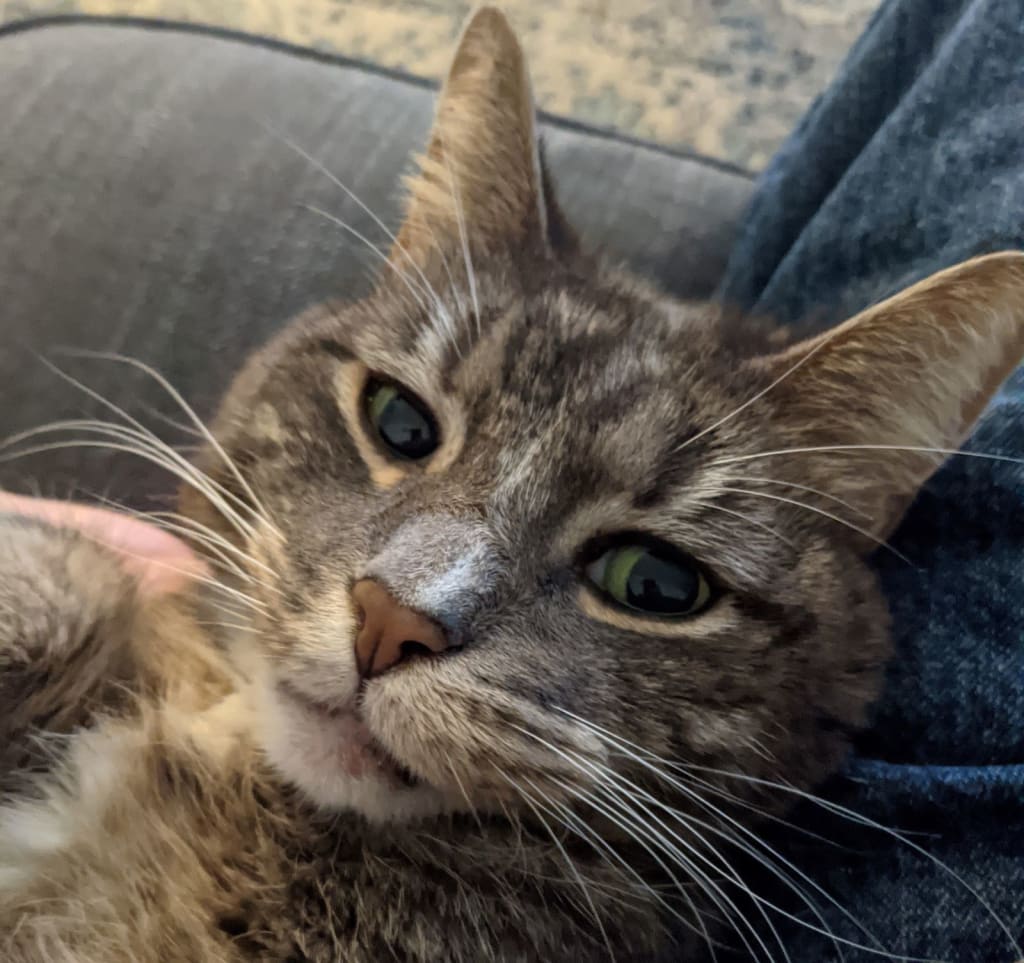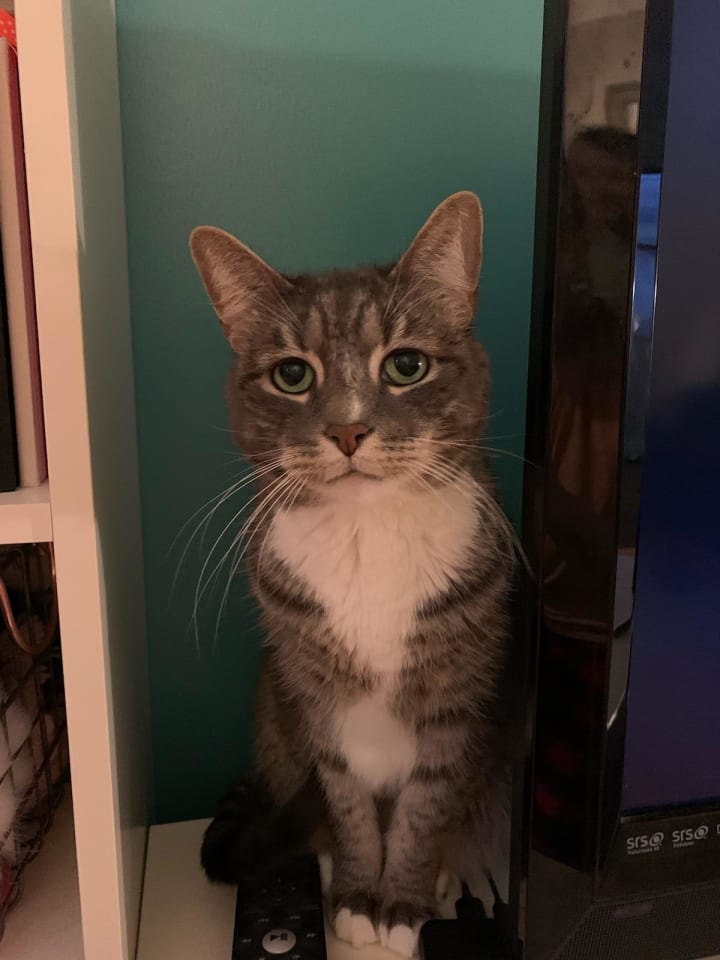On Parenting and the Loss of a Pet
Reflection and Remembrance

Two days before Thanksgiving we had to euthanize Jerry, our twelve-year-old gray tabby. He was diagnosed with lung cancer last March, so we were both lucky and happy to have him with us for as long as we did. That said, I'd been struggling with his absence in ways that I haven't with other losses, both human and animal.
I think part of it stems from my current stage of life. As a parent of two young children, I feel everything much more deeply than I have at any point since my own childhood. The pride that swells from their accomplishments, the pain when they're hurting physically or emotionally, the joy of learning and discovery, and the frustration from setbacks and failures are my pride, pain, joy, and frustration. Knowing the love they had for Jerry and how his loss would hurt them intensified the sadness that I felt.
My kids are both close to the age now that I was when my parents had our golden retriever-German shepherd mix put to sleep. Like Nate and Abby with Jerry, I didn't know a world without Sultan. He was my constant companion from the time I could crawl, romping around the backyard in both snow and sunshine or curled up next to me on the basement couch while I played Frogger or Pitfall on a 13-inch black-and-white TV. Similarly, Jerry was always around, especially in the evenings around bedtime. Almost every night, he'd bring his favorite toy mouse up to Nate's or Abby's bedroom and leave it on the floor next to one of their beds before curling up nearby as they drifted off to sleep.
In the months before Sultan passed, I knew he wasn't well because my parents told my brother and me that he was diagnosed with a form of canine leukemia. I understood that meant his time with us was limited and I'd already experienced the death of a loved one when my grandmother passed away earlier that year, but I was still unprepared for the loss of my beloved friend. Looking back, I think it was because my grandmother had been ill for some time before her death so I had time to prepare myself for it. Sultan, by contrast, seemed healthy, strong, and vital until just a week or so before that final trip to the vet.

Like Sultan, Jerry was as sweet, loving, and playful as ever right until the end. He slept a little more than usual, but never hid or shied away from contact with the family. If anything, he was around more than ever, taking every opportunity to cuddle into a lap or snuggle into bed. Even the day we took him to the vet for the last time, we were hopeful that he might come home with us, even if only for a few more weeks. Sadly, it was not to be. My wife and I sat with him as the veterinarian and the tech administered the euthanizing shots. I did my best to hold it together in his final moments and I think I only managed as well as I did because Jenn was there with me.
When we got home from the vet, we had to break it to the kids. We'd been as open and transparent with them as possible throughout Jerry's illness. We'd told them about his cancer diagnosis from the beginning and they were active in monitoring his health in the months after. Like Sultan's seeming good health when I was a child, Jerry's good nature and consistent presence since his diagnosis had lulled them into thinking we had more time with him.
Both kids took it hard, but in different ways. Nate wears his heart on his sleeve, so he let his emotions flow. Abby, while younger, has a better poker face; she tried not to show her feelings, shifting a little uncomfortably in her seat at the end of the couch but telling us she was ok. After a few minutes she changed the subject before excusing herself to her bedroom.
In the weeks after Jerry's passing, Abby's processed his death in her own way. At first, when she did talk about him, she continued to use the present tense. More recently, she's started to speak about what he did and was, instead of does and is. Most importantly, though, she remembers him with joy.
Reflecting on it all, the example of my parents was a guiding force in how I approached sharing the details of Jerry's health with the kids. To anyone currently dealing with similar healthcare issues with pets, here are some tips for talking to your children about it:
Be open and honest. Be clear about what's happening to your pet, using language that is appropriate for your children's ages and development. Even if you have to keep it simple, it's helpful to share as much as possible... and if there are things you don't know, share that too.
Include your kids in caring for your pet. This helps your children maintain and even strengthen their link to your pet. They get to see that illness and death are part of life. They'll see that even in illness, pets (and humans) have good days and bad days and that there can still be some joy amid the sadness. Through their interactions with the sick pet, they'll develop empathy and learn that they don't need to fear being in contact with someone who is ill or dying.
Share your emotions. Let your children see that it's ok to cry, get angry, and even laugh sometimes when dealing with the illness of someone you love. Talk to them about how you're feeling and how you deal with those feelings. Encourage them to tell you what they're thinking and the questions they may have. Modeling healthy ways to deal with grief will serve your kids well in the future.
Celebrate the life of your pet. While the death of a pet is a sad occasion, you've had years of great memories together. Share stories of the sweet and funny things your pet has done. Lately, we've been laughing about the year Jerry tore open a bakery box on the kitchen table and ate the top of the apple pie we were going to bring to Jenn's parents' house for Christmas dessert. Admittedly, it wasn't all that humorous at the time, but it's a perfect memory of who Jerry was and how we'd forgive him for just about anything. He was that loving and special.
Cornell University's College of Veterinary Medicine has helpful resources and even a support hotline if you have questions about pet euthanasia or difficulty with the grieving process.
About the Creator
Sean Johnson
Writer of short stories, poetry, and articles in the pop culture and lifestyle categories.






Comments
There are no comments for this story
Be the first to respond and start the conversation.